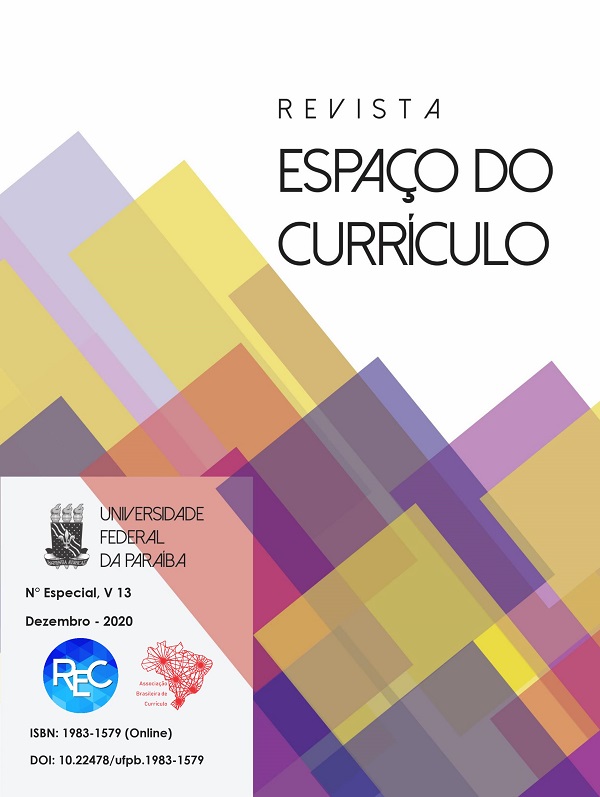CURRICULUM, SEXUALITY AND TEACHING ACTION
discursive developments and the senses produced in the school context
DOI:
https://doi.org/10.22478/ufpb.1983-1579.2020v13nEspecial.54710Keywords:
Sexual diversity, Curriculum, Education, DifferenceAbstract
Gender and sexuality studies have always been a controversial issue, dividing opinions regarding their discussion in the school context. In general, the approaches related to sexuality and gender that permeate the school curriculum are instituted from concepts linked to the pattern of heteronormativity. The objective of this research was to analyze the academic production on curriculum, sexual diversity and teaching action in the school context and the meanings built in this movement of construction of knowledge. To this end, a state of the art was carried out from the analysis of dissertations and theses, published between the years 2009 and 2019. The findings pointed to a discussion still operated by the biologizing bias, with a focus on human reproduction, taking as an argument to explain postures in relation to the subject. From the bibliographic survey, it was noticed that there is still little discussion on curriculum / curriculum policies that approach the theme in more depth, in terms of political-philosophical understandings, sometimes presenting themselves in a very punctual and superficial way. In view of the above, it is considered necessary to expand the debate on the possibility of contributing so that the school can think of strategies to deal with this issue, transforming itself into a space that recognizes differences.
Downloads
Metrics
References
ABREU, Rachel Luiza Pulcino; SANTOS, Raquel Alexandre Pinho dos. Gênero e sexualidade nos PNCs: uma análise dos objetivos gerais. Caderno Espaço Feminino- Uberlândia-MG- v.28, n.1. 24-35- Jan/Jun, 2015. p. 24-35. Disponível em: http://www.seer.ufu.br/index.php/neguem/article/view/283733. Acesso em: 24 ago 2020.
BARBOSA, Luciana Uchôa, VIÇOSA, Cátia Silene Carrazoni Lopes, FOLMER, Vanderlei. A educação sexual nos documentos das políticas de educação e suas ressignificações. Revista Eletrônica Acervo Saúde. Vol. 11(10)| e772. 1-10, 2019. p. 1-10. Disponível em: https://acervomais.com.br/index.php/saude/article/view/772/515. Acesso em: 24 ago 2020.
BHABHA, Homi K. A questão do “outro”: diferença, discriminação e o discurso do colonialismo. Pós-modernismo e política / organização de Heloisa Buarque, de Hollanda. - Rio de Janeiro: Rocco, 1991.
FURLANI, Jimena. Educação Sexual — quando a articulação de múltiplos discursos possibilita sua inclusão curricular. PERSPECTIVA, Florianópolis, v. 26, n. 1, 283-317, jan./jun. 2008. p. 283-317. Disponível em: https://periodicos.ufsc.br/index.php/perspectiva/article/view/2175-795x.2008v26n1p283. Acesso em: 24 ago 2020.
Autoria x e Autoria y. Políticas Curriculares e Formação de professores: isto ou aquilo? Ou o mesmo? In: FRANGELLA, Rita de Cássia Prazeres; OLIVEIRA, Meyre-Ester Barbosa de (orgs). Currículo e formação de professores: sobre fronteiras e atravessamentos. Curitiba: CRV, 2017. 210 p.
JESUS, Beto et al. Diversidade sexual na escola: uma metodologia de trabalho com adolescentes e jovens. Ed. Especial, revista e ampliada. – São Paulo: ECOS – Comunicação em Sexualidade, 2008. p. 92. Disponível em: http://www.acaoeducativa.org.br/fdh/wp-content/uploads/2015/11/Diversidade-Sexual-na-Escola-uma-metodologia-de-trabalho-CORSA-e-ECOS-2008-1.pdf. Acesso em: 24 ago 2020.
JUNQUEIRA, Rogério Diniz. Pedagogia do armário – A normatividade em ação. Revista Retratos da Escola, Brasília, v. 7, n. 13, jul./dez. 2013. p. 481-498.
LACLAU, Ernesto; MOUFFE, Chantal. Hegemony and Socialist Strategy: towards a Radical Democratic Politics. London: Verso, 1985. 326 p.
LOURO, Guacira Lopes. Gênero, sexualidade e educação. Petrópolis, RJ. Uma perspectiva pós-estruturalista. Vozes, 1997. 179 p.
LOURO, Guacira Lopes. Gênero e sexualidade: pedagogias contemporâneas. Pro-Posições, v. 19. n. 2 (56). 17-23. maio/ago, 2008. p.17-23. Disponível em: https://www.scielo.br/pdf/pp/v19n2/a03v19n2.pdf. Acesos em: 24 ago 2020
LOPES, Alice Casimiro; MACEDO, Elizabeth. Teorias de Currículo. São Paulo: Cortez, 2011. p. 279.
MACEDO, Elizabeth. Currículo e conhecimento: Aproximações entre educação e ensino. Cadernos de Pesquisa, vol.42, n.147, p. 716-737, 2012. p. 716-737.
MACEDO, Elizabeth. Diálogos curriculares entre Brasil e México. Organização Alice Casimiro Lopes, Alicia de Alba. – Rio de Janeiro: EdUERJ, 2014.
MOITA LOPES, Luís Paulo. Multiculturalismo: diferenças culturais e práticas pedagógicas / Antônio Flávio Moreira, Vera Maria Candau (Orgs.). 2. ed. - Petrópolis, RJ: Vozes, 2008.
RANNIERY, Thiago. Currículo, normatividade e políticas de reconhecimento a partir trajetórias escolares de “meninos gays”. Arquivos Analíticos de Políticas Educativas, 25(51), 2017a. http://dx.doi.org/10.14507/epaa.25.2835
RANNIERY, Thiago. Sexualidade na escola: é possível ir além da máquina de diferentes?. In: MACEDO, Elizabeth; RANNIERY, Thiago (Orgs). Currículo, sexualidade e ação docente. Rio de Janeiro: DP ET ali, 2017b.
SEFFNER, Fernando. Equívocos e Armadilhas na Articulação entre Diversidade Sexual e Políticas de Inclusão Escolar. In: JUNQUEIRA, Rogério Diniz (org). Diversidade Sexual na Educação: problematizações sobre a homofobia nas escolas. Brasília: Ministério da Educação, Secretaria de Educação Continuada, Alfabetização e Diversidade, UNESCO, v. 32. 2009. p. 458. Disponível em: http://pronacampo.mec.gov.br/images/pdf/bib_volume32_diversidade_sexual_na_educacao_problematizacoes_sobre_a_homofobia_nas_escolas.pdf. Acesso em: 24 ago 2020.
SILVA, Tomaz Tadeu da. Identidade e diferença: a perspectiva dos estudos culturais. Petrópolis, RJ: Vozes, 2000. 133 p.
SKLIAR, Carlos. A educação e a pergunta pelos Outros: diferença, alteridade, diversidade e os outros "outros". Ponto de Vista, Florianópolis, n.05, p. 37-49, 2003. p. 37-49. Disponível em: https://periodicos.ufsc.br/index.php/pontodevista/article/view/1244. Acesso em: 24 ago 2020.
Downloads
Published
How to Cite
Issue
Section
License
Copyright (c) 2020 Curriculum Space Journal

This work is licensed under a Creative Commons Attribution 4.0 International License.
By submitting an article to Curriculum Space Journal (CSJ) and having it approved, the authors agree to assign, without remuneration, the following rights to Curriculum Space Journal: first publication rights and permission for CSJ to redistribute this article. article and its metadata to the indexing and reference services that its editors deem appropriate.
















